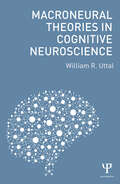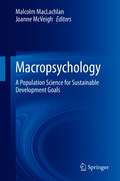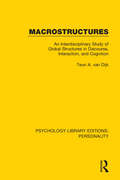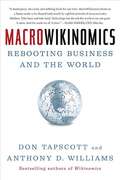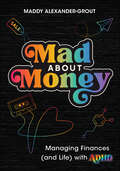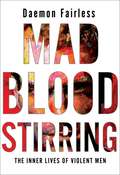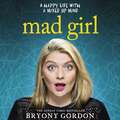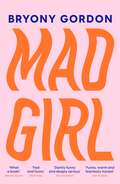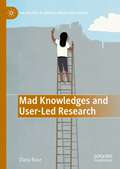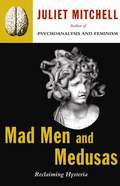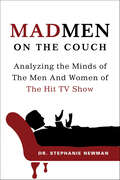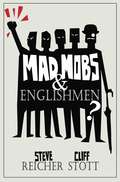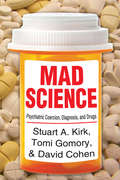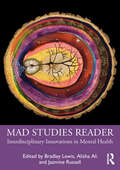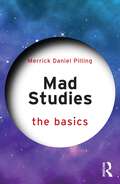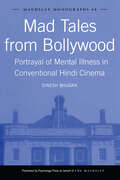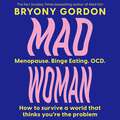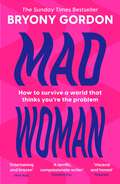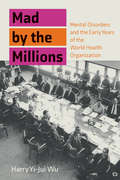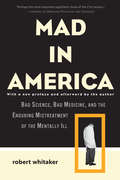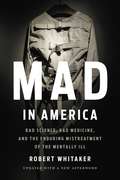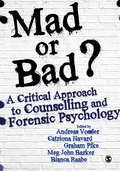- Table View
- List View
Macroneural Theories in Cognitive Neuroscience
by William R. UttalIn this book, William R. Uttal continues his analysis and critique of theories of mind. This book considers theories that are based on macroneural responses (such as those obtained from fMRI) that represent the averaged or cumulative responses of many neurons. The analysis is carried out with special emphasis on the logical and conceptual difficulties in developing a theory but with special attention to some of the current attempts to go from these cumulative responses to explanations of the grand question of how the mind is generated by the brain. While acknowledging the importance of these macroneural techniques in the study of the anatomy and physiology of the brain, Uttal concludes that this macroneural approach is not likely to produce a valid neural theory of cognition because the critical information—the states of the individual neurons—involved in brain activity becoming mental activity is actually lost in the process of summation. Controversial topics are considered in detail including discussions of empirical, logical, and technological barriers to theory building in cognitive neuroscience.
Macropsychology: A Population Science for Sustainable Development Goals
by Malcolm MacLachlan Joanne McVeighThis volume argues for the development of a macro perspective within psychology that more effectively incorporates social structures, systems, policies, and institutions. The book emphasizes how social structures and systems can ultimately promote, or erode, psychological wellbeing. Macropsychology is concerned with “understanding up,” or how we can influence the settings and conditions of the society in which we live. Psychology has traditionally been more interested in “understanding down,” that is, with the behaviour of individuals and groups; in inter-psychic and intra-psychic and in neurological and biological processes. This volume argues that psychology can more effectively contribute at the macro or societa level, by addressing grand challenges and global goals, using big data, and intervening at the population level.Bringing together social, organizational, cultural, and health psychology research, the book demonstrates a broad range of areas benefitting from a macropsychology perspective, particularly areas integral to the realization of the Sustainable Development Goals (SDGs). Contributors address the value of macropsychological perspectives in addressing sub-topics such as: Mental healthPersonality traits and social structureDisability rightsFood systems Humanitarian work psychology Macropsychology: A Population Science for Sustainable Development Goals aims to recognise and give impetus to a neglected perspective within psychology, and to inspire a paradigm-widening within the field of psychology, facilitating greater involvement with social justice and human rights.
Macrostructures: An Interdisciplinary Study of Global Structures in Discourse, Interaction, and Cognition (Psychology Library Editions: Personality)
by Teun A. van DijkMacrostructures are higher-level semantic or conceptual structures that organize the ‘local’ microstructures of discourse, interaction, and their cognitive processing. They are distinguished from other global structures of a more schematic nature, which we call superstructures. Originally published in 1980, the theory of macrostructures outlined in this book is the result of research carried out during the previous 10 years in the domains of literary theory, text grammar, the general theory of discourse, pragmatics, and the cognitive psychology of discourse processing. The presentation of the theory is systematic but informal and at this stage was not intended to be fully formalized.
Macrowikinomics: Rebooting Business and the World
by Don Tapscott Anthony D. WilliamsIn their 2007 bestseller, Wikinomics Don Tapscott and Anthony Williams showed the world how mass collaboration was changing the way businesses communicate, create value, and compete in the new global marketplace. Now, in the wake of the global financial crisis, the principles of wikinomics have become more powerful than ever. Many of the institutions that have served us well for decades or centuries seem stuck in the past and unable to move forward. And yet, in every corner of the globe, a powerful new model of economic and social innovation is sweeping across all sectors--one where people with drive, passion, and expertise take advantage of new Web-based tools to get more involved in making the world more prosperous, just, and sustainable.
Mad About Money: Managing Finances (and Life) with ADHD
by Maddy Alexander-GroutMad About Money will help you to make sense of your life if you are neurodivergent or suspect you might be. Maddy, a 40 year old mum of two, has had her fair share of struggles with money, life and business without always understanding why. With her ADHD and Autism diagnosis, everything suddenly made more sense, and she has used her diagnosis to improve her life. Mad About Money: Managing finances (and life) with ADHD is not your typical money book, it is an unfiltered, honest, sweary and inspiring journey through the life of an undiagnosed neurodivergent woman. Award-winning writer and CPD-accredited neurodiversity specialist , money and business coach Maddy Alexander-Grout walks you through the story of her life. By sharing her own difficulties with money, spending, and debt, she shows you how to apply the lessons she learned in climbing back from over £40000 in consumer debt. But this book is not just about money, it's about the struggles she has had along the way as an undiagnosed neurodivergent with ADHD, Autism, Dyspraxia and more. This book will give you actionable tips to navigate life as a neurodivergent, manage your money, learn to understand your brain and make sense of your past, especially if you are, or suspect you, are neurodivergent. In the book: Applicable strategies for managing your money, parenting , mental health and starting a business as an undiagnosed neurodivergent Tips for managing your ADHD and other neurodivergent conditions Strategies for how to deal with a range of financial challenges—including debt and spending addictions—when you're neurodivergent An essential read for anyone who is neurodivergent or suspects they might be, especially if they have struggled with money and life up to now. Mad About Money is empowering, insightful and the perfect read for anyone who feels misunderstood in a world designed for neurotypical people.
Mad Blood Stirring: The Inner Lives Of Violent Men
by Daemon FairlessWith a rare clarity and fearless honesty, journalist Daemon Fairless tackles the horrors and compulsions of male violence from the perspective of someone who struggles with violent impulses himself, creating a non-fiction masterpiece with the narrative power of novels such as Fight Club and A History of Violence.A man, no matter how civilized, is still an animal--and sometimes a dangerous one. Men are responsible for the lion's share of assault, rape, murder and warfare. Conventional wisdom chalks this up to socialization, that men are taught to be violent. And they are. But there's more to it. Violence is a dangerous desire--a set of powerful and inherent emotions we are loath to own up to. And so there remains a hidden geography to male violence--an inner ecosystem of rage, dominance, blood-lust, insecurity and bravado--yet to be mapped. Mad Blood Stirring is journalist Daemon Fairless's riveting first-person travelogue through this territory as he seeks to understand the inner lives of violent men and, ultimately, himself.
Mad Girl
by Bryony GordonBryony Gordon has OCD.It's the snake in her brain that has told her ever since she was a teenager that her world is about to come crashing down: that her family might die if she doesn't repeat a phrase 5 times, or that she might have murdered someone and forgotten about it. It's caused alopecia, bulimia, and drug dependency. And Bryony is sick of it. Keeping silent about her illness has given it a cachet it simply does not deserve, so here she shares her story with trademark wit and dazzling honesty.A hugely successful columnist for the Telegraph, a bestselling author, and a happily married mother of an adorable daughter, Bryony has managed to laugh and live well while simultaneously grappling with her illness. Now it's time for her to speak out. Writing with her characteristic warmth and dark humour, Bryony explores her relationship with her OCD and depression as only she can.Mad Girl is a shocking, funny, unpredictable, heart-wrenching, raw and jaw-droppingly truthful celebration of life with mental illness.(P)2016 Headline Digital
Mad Girl: A Happy Life With A Mixed Up Mind: A celebration of life with mental illness from mental health campaigner Bryony Gordon
by Bryony GordonTHE NUMBER 1 SUNDAY TIMES BESTSELLER AND RICHARD & JUDY BOOK CLUB 2017 PICKA new Sunday Times bestseller from Bryony Gordon, Telegraph columnist and author of the bestselling The Wrong Knickers. For readers who enjoyed Matt Haig's Reasons to Stay Alive and Ruby Wax's Sane New World, Mad Girl is a shocking, funny, unpredictable, heart-wrenching, raw and jaw-droppingly truthful celebration of life with mental illness.'I loved it. A brilliant fast and funny and frank look at something that absolutely needs to be talked about in this way' Matt HaigBryony Gordon has OCD.It's the snake in her brain that has told her ever since she was a teenager that her world is about to come crashing down: that her family might die if she doesn't repeat a phrase 5 times, or that she might have murdered someone and forgotten about it. It's caused alopecia, bulimia, and drug dependency. And Bryony is sick of it. Keeping silent about her illness has given it a cachet it simply does not deserve, so here she shares her story with trademark wit and dazzling honesty.A hugely successful columnist for the Telegraph, a bestselling author, and a happily married mother of an adorable daughter, Bryony has managed to laugh and live well while simultaneously grappling with her illness. Now it's time for her to speak out. Writing with her characteristic warmth and dark humour, Bryony explores her relationship with her OCD and depression as only she can.Mad Girl is a shocking, funny, unpredictable, heart-wrenching, raw and jaw-droppingly truthful celebration of life with mental illness.
Mad Girl: A Happy Life With A Mixed Up Mind: A celebration of life with mental illness from mental health campaigner Bryony Gordon
by Bryony GordonTHE NUMBER 1 SUNDAY TIMES BESTSELLER AND RICHARD & JUDY BOOK CLUB 2017 PICKA new Sunday Times bestseller from Bryony Gordon, Telegraph columnist and author of the bestselling The Wrong Knickers. For readers who enjoyed Matt Haig's Reasons to Stay Alive and Ruby Wax's Sane New World, Mad Girl is a shocking, funny, unpredictable, heart-wrenching, raw and jaw-droppingly truthful celebration of life with mental illness.'I loved it. A brilliant fast and funny and frank look at something that absolutely needs to be talked about in this way' Matt HaigBryony Gordon has OCD.It's the snake in her brain that has told her ever since she was a teenager that her world is about to come crashing down: that her family might die if she doesn't repeat a phrase 5 times, or that she might have murdered someone and forgotten about it. It's caused alopecia, bulimia, and drug dependency. And Bryony is sick of it. Keeping silent about her illness has given it a cachet it simply does not deserve, so here she shares her story with trademark wit and dazzling honesty.A hugely successful columnist for the Telegraph, a bestselling author, and a happily married mother of an adorable daughter, Bryony has managed to laugh and live well while simultaneously grappling with her illness. Now it's time for her to speak out. Writing with her characteristic warmth and dark humour, Bryony explores her relationship with her OCD and depression as only she can.Mad Girl is a shocking, funny, unpredictable, heart-wrenching, raw and jaw-droppingly truthful celebration of life with mental illness.
Mad Knowledges and User-Led Research (The Politics of Mental Health and Illness)
by Diana Susan RoseThis book presents a critical examination of the development of user involvement within research, and investigates the issues currently preventing a productive integration of Mad knowledges within research and practice. Drawing on social, linguistic and critical theories, it proposes the conditions needed to address the development of Mad epistemologies. The author’s unique approach deliberately highlights her own positionality and draws on decades of experience as a service recipient, survivor, activist and researcher to illustrate the structural and symbolic barriers faced. Employing concepts including epistemic injustice, individualization, normalization and structural violence, it suggests a radically new way of articulating ‘what’s the matter with us?’ In doing so, the book itself goes some way towards enacting the radical challenge to academic and epistemic hierarchies which, it is argued, will be required to further advance mad knowledges and user-led research. Crucially, it demonstrates how this approach can be both methodologically and conceptually rigorous. This novel work holds important insights for students and scholars across the humanities and social sciences; particularly those working in the areas of critical psychology, disability studies, Mad studies, feminist studies, critical race theory, and Queer theory.
Mad Men and Medusas: Reclaiming Hysteria
by Juliet MitchellThis worthy successor to Juliet Mitchell's pathbreaking Psychoanalysis and Feminism is both a defense of the long-dismissed diagnosis of hysteria as a centerpiece of the human condition and a plea for a new understanding of the influence of sibling and peer relationships. In Mad Men and Medusas Mitchell traces the history of hysteria, arguing that we need to reclaim hysteria to understand how distress and trauma express themselves in different societies and different times. Mitchell convincingly demonstrates that although hysteria may have disappeared as a disease, it is still a critical factor in understanding psychological development through the life cycle.
Mad Men on the Couch: Analyzing the Minds of The Men And Women of The Hit TV Show
by Stephanie NewmanMad Men has captured the imaginations of millions of viewers, winning fifteen golden globes and four Emmys. Perhaps more than the gorgeously stylized visuals and impeccably re-created history, it's the show's richly drawn characters stumbling through their personal and professional lives that get under our skin and keep us invested.In Mad Menon the Couch, Dr. Stephanie Newman analyzes the show's primary characters through the lens of modern psychology. Lending her trained professional eye, she poses and expertly answers pressing questions such as:Why does Don constantly sabotage himself? Why is Betty such a cold mother and desperately unhappy housewife? (Hint: It's not just because her "people are Nordic.")Why does Pete prevail in adversity when Roger crumbles?Why is Peggy able to rise profesionally in the male jungle of Madison Avenue when Joan can't?Can these characters ever really change?With critical commentary that is both entertaining and insightful, Mad Men on the Couch will provide viewers with a unique persepctive on the show.
Mad Mobs and Englishmen?: Myths And Realities Of The 2011 Riots
by Cliff Stott Steve ReicherIn August 2011, London and many other English towns and cities erupted into some of the worst rioting for decades. David Cameron blamed a broken society with a sick morality; Tony Blair a defiant underclass. Yet with no evidence to support their claims, their remarks were typical of the storm of uninformed comments that followed the riots, based largely on longstanding misconceptions of why people riot. With their extensive expertise in crowd behaviour and psychology, and years of research experience studying crowds, riots and hooliganism worldwide, psychologists Steve Reicher and Cliff Stott challenge the myths of the 2011 riots perpetuated in the media and elsewhere; consider the reality on the ground and how to avoid a repeat scenario.
Mad Mobs and Englishmen?: Myths and realities of the 2011 riots
by Steve Reicher Professor Cliff StottIn August 2011, London and many other English towns and cities erupted into some of the worst rioting for decades. David Cameron blamed a broken society with a sick morality; Tony Blair a defiant underclass. Yet with no evidence to support their claims, their remarks were typical of the storm of uninformed comments that followed the riots, based largely on longstanding misconceptions of why people riot. With their extensive expertise in crowd behaviour and psychology, and years of research experience studying crowds, riots and hooliganism worldwide, psychologists Steve Reicher and Cliff Stott challenge the myths of the 2011 riots perpetuated in the media and elsewhere; consider the reality on the ground and how to avoid a repeat scenario.
Mad Science: Psychiatric Coercion, Diagnosis, and Drugs
by Stuart A. Kirk*Winner of an honorable mention from theSociety for Social Work and ResearchforOutstanding Social Work Book AwardMad Science argues that the fundamental claims of modern American psychiatry are based on misconceived, flawed, and distorted science. The authors address multiple paradoxes in American mental health research, including the remaking of coercion into scientific psychiatric treatment, the adoption of an unscientific diagnostic system that controls the distribution of services, and how drug treatments have failed to improve the mental health outcome.When it comes to understanding and treating mental illness, distortions of research are not rare, misinterpretation of data is not isolated, and bogus claims of success are not voiced by isolated researchers seeking aggrandizement. This book's detailed analysis of coercion and community treatment, diagnosis, and psychopharmacology reveals that these characteristics are endemic, institutional, and protected in psychiatry. They are not just bad science, but mad science.This book provides an engaging and readable scientific and social critique of current mental health practices. The authors are scholars, researchers, and clinicians who have written extensively about community care, diagnosis, and psychoactive drugs. This paperback edition makes Mad Science accessible to all specialists in the field as well as to the informed public.
Mad Studies Reader: Interdisciplinary Innovations in Mental Health
by Bradley Lewis, Alisha Ali and Jazmine RussellThe last few years have brought increased writings from activists, artists, scholars, and concerned clinicians that cast a critical and constructive eye on psychiatry, mental health care, and the cultural relations of mental difference. With particular focus on accounts of lived experience and readings that cover issues of epistemic and social injustice in mental health discourse, the Mad Studies Reader brings together voices that advance anti-sanist approaches to scholarship, practice, art, and activism in this realm.Beyond offering a theoretical and historical overview of mad studies, this Reader draws on the perspectives, voices, and experiences of artists, mad pride activists, humanities and social science scholars, and critical clinicians to explore the complexity of mental life and mental difference. Voices from these groups confront and challenge standard approaches to mental difference. They advance new structures of meaning and practice that are inclusive of those who have been systematically subjugated and promote anti-sanist approaches to counter inequalities, prejudices, and discrimination. Confronting modes of psychological oppression and the power of a few to interpret and define difference for so many, the Mad Studies Reader asks the critical question of how these approaches may be reconsidered, resisted, and reclaimed.This collection will be of interest to mental health clinicians; students and scholars of the arts, humanities and social sciences; and anyone who has been affected by mental difference, directly or indirectly, who is curious to explore new perspectives.
Mad Studies: The Basics (The Basics)
by Merrick Daniel PillingMad Studies: The Basics provides an introductory account of a field that emerged from, and must remain grounded within, community knowledge, activism, and the perspectives of those who have experienced madness and mental health systems.It is a concise text that introduces the field through an exploration of some origins of Mad Studies, as well as two interrelated queries: what does Mad Studies help us understand, and what does Mad Studies help us do? This exploration reveals that Mad Studies is an interdisciplinary, intersectional, and multi-vocal field that demands different answers to the very meaning of the beliefs, behaviours, and bodymind experiences that are currently characterized as being indicative of mental illness. At the heart of Mad Studies is a liberationist desire to resist, transform, and abolish the systems that create marginalization, and implement responses to madness that are grounded in the collective knowledge of those deemed Mad. This book shows that the contributions of Indigenous, Black, racialized, queer, and trans people must be understood as central to, and already embedded within, Mad Studies and activism rather than as add-ons, expansions, or efforts to make Mad Studies more inclusive.It will be of interest to all scholars and students of disability studies, social work, gender studies, education, health sciences, sociology, and psychology, as well as practitioners in mental health care, and those with lived experience of madness and mental health systems.
Mad Tales from Bollywood: Portrayal of Mental Illness in Conventional Hindi Cinema (Maudsley Series #48)
by Dinesh BhugraThis is the first book to investigate how mental illness is portrayed in Hindi cinema. It examines attitudes towards mental illness in Indian culture, how they are reflected in Hindi films, and how culture has influenced the portrayal of the psychoses. Dinesh Bhugra guides the reader through the history of Indian cinema, covering developments from the idealism of the 1950s to the stalking, jealousy and psychopathy that characterises the films of the 1990s. Critiques of individual films demonstrate the culture’s approach towards mental illness and reflect the impact of culture on films and vice versa. Subjects covered include: Cinema and emotion Attitudes towards mental illness Socio-economic factors and cinema in India Indian personality, villainy and history Psychoanalysis in the films of the 60s. Mad Tales from Bollywood will be of interest to psychiatrists, mental health professionals, students of media and cultural studies and anyone with an interest in Indian culture.
Mad Woman: The hotly anticipated follow-up to lifechanging bestseller, MAD GIRL
by Bryony GordonBryony Gordon presents the long-anticipated follow up to her phenomenal Number One Sunday Times Bestseller, Mad Girl.Ten years on from first writing about her own experiences of mental illness, Bryony Gordon still receives messages about the effects it has on people. Now perimenopausal and well into the next stage of her life, parenting an almost-adolescent, just what has that help - and that connection with other unwell people - taught Bryony about herself, and the society we live in? What has she learned, and why have her views on mental health changed so radically? After coming out the other side of the biggest trauma of our living memory - a global pandemic - existing in a state of perma-crisis has now become our new normal.From burnout and binge eating, to living with fluctuating hormones and the endless battle to stay sober, Bryony begins to question whether she got mental illness wrong in the first place. Is it simply a chemical imbalance, or rather a normal response from your brain telling you that something isn't right? Mad Woman explores the most difficult of all the lesson she's learned over the last decade - that our notion of what makes a happy life is the very thing that's making us so sad.(P)2024 Headline Publishing Group Ltd
Mad Woman: The hotly anticipated follow-up to lifechanging bestseller, MAD GIRL
by Bryony Gordon'Visceral and honest' Telegraph'Bryony Gordon is a terrific, compassionate writer' Elizabeth Day'Bryony writes with such entertaining and brazen candour about mental illness...she really helps people tackle their own stuff. Her writing has helped me before and this will be another hit' Matt HaigTHE HOTLY ANTICIPATED FOLLOW-UP TO SUNDAY TIMES BESTSELLER*, MAD GIRLWhat if our notion of what makes us happy is the very thing that's making us so sad?Ten years on from first writing about her own experiences of mental illness, Bryony Gordon still receives messages about the effect it has on people. Now perimenopausal and well into the next stage of her life, parenting an almost-adolescent, just what has that help - and that connection with other unwell people - taught Bryony about herself, and the society we live in? What has she learned, and why have her views on mental health changed so radically? After coming out the other side of the biggest trauma of our living memory - a global pandemic - existing in a state of perma-crisis has now become our new normal.From burnout and binge eating, to living with fluctuating hormones and the endless battle to stay sober, Bryony begins to question whether she got mental illness wrong in the first place. Is it simply a chemical imbalance, or rather a normal response from your brain telling you that something isn't right? Mad Woman explores the most difficult of all the lessons she's learned over the last decade - that our notion of what makes a happy life is the very thing that's making us so sad.Bestselling author Bryony Gordon is unafraid to write with her trademark blend of compassion, honesty and humour about her personal challenges and demons, which means her books and journalism have had profound impact on readers. She founded the mental health charity, Mental Health Mates, which has become a vast online community.*Bryony Gordon's Mad Girl was a number one Sunday Times bestseller on 12th June 2016.
Mad Woman: The hotly anticipated follow-up to lifechanging bestseller, MAD GIRL
by Bryony Gordon'Visceral and honest' Telegraph'Bryony Gordon is a terrific, compassionate writer' Elizabeth Day'Bryony writes with such entertaining and brazen candour about mental illness...she really helps people tackle their own stuff. Her writing has helped me before and this will be another hit' Matt HaigTHE HOTLY ANTICIPATED FOLLOW-UP TO SUNDAY TIMES BESTSELLER*, MAD GIRLWhat if our notion of what makes us happy is the very thing that's making us so sad?Ten years on from first writing about her own experiences of mental illness, Bryony Gordon still receives messages about the effect it has on people. Now perimenopausal and well into the next stage of her life, parenting an almost-adolescent, just what has that help - and that connection with other unwell people - taught Bryony about herself, and the society we live in? What has she learned, and why have her views on mental health changed so radically? After coming out the other side of the biggest trauma of our living memory - a global pandemic - existing in a state of perma-crisis has now become our new normal.From burnout and binge eating, to living with fluctuating hormones and the endless battle to stay sober, Bryony begins to question whether she got mental illness wrong in the first place. Is it simply a chemical imbalance, or rather a normal response from your brain telling you that something isn't right? Mad Woman explores the most difficult of all the lessons she's learned over the last decade - that our notion of what makes a happy life is the very thing that's making us so sad.Bestselling author Bryony Gordon is unafraid to write with her trademark blend of compassion, honesty and humour about her personal challenges and demons, which means her books and journalism have had profound impact on readers. She founded the mental health charity, Mental Health Mates, which has become a vast online community.*Bryony Gordon's Mad Girl was a number one Sunday Times bestseller on 12th June 2016.
Mad by the Millions: Mental Disorders and the Early Years of the World Health Organization (Culture and Psychiatry)
by Harry Yi-Jui WuThe World Health Organization's post-World War II work on the epidemiology and classification of mental disorders and its vision of a "world psyche."In 1946, the World Health Organization undertook a project in social psychiatry that aimed to discover the epidemiology and classification of mental disorders. In Mad by the Millions, Harry Y-Jui Wu examines the WHO's ambitious project, arguing that it was shaped by the postwar faith in technology and expertise and the universalizing vision of a "world psyche." Wu shows that the WHO's idealized scientific internationalism laid the foundations of today's highly highly metricalized global mental health system.
Mad in America: Bad Science, Bad Medicine, and the Enduring Mistreatment of the Mentally Ill
by Robert WhitakerSchizophrenics in the United States currently fare worse than patients in the world's poorest countries. In Mad in America, medical journalist Robert Whitaker argues that modern treatments for the severely mentally ill are just old medicine in new bottles, and that we as a society are deeply deluded about their efficacy. The widespread use of lobotomies in the 1920s and 1930s gave way in the 1950s to electroshock and a wave of new drugs. In what is perhaps Whitaker's most damning revelation, Mad in America examines how drug companies in the 1980s and 1990s skewed their studies to prove that new antipsychotic drugs were more effective than the old, while keeping patients in the dark about dangerous side effects. A haunting, deeply compassionate book--now revised with a new introduction--Mad in America raises important questions about our obligations to the mad, the meaning of "insanity," and what we value most about the human mind.
Mad in America: Bad Science, Bad Medicine, and the Enduring Mistreatment of the Mentally Ill
by Robert WhitakerAn updated edition of the classic history of schizophrenia in America, which gives voice to generations of patients who suffered through "cures" that only deepened their suffering and impaired their hope of recoverySchizophrenics in the United States currently fare worse than patients in the world's poorest countries. In Mad in America, medical journalist Robert Whitaker argues that modern treatments for the severely mentally ill are just old medicine in new bottles, and that we as a society are deeply deluded about their efficacy. The widespread use of lobotomies in the 1920s and 1930s gave way in the 1950s to electroshock and a wave of new drugs. In what is perhaps Whitaker's most damning revelation, Mad in America examines how drug companies in the 1980s and 1990s skewed their studies to prove that new antipsychotic drugs were more effective than the old, while keeping patients in the dark about dangerous side effects. A haunting, deeply compassionate book-updated with a new introduction and prologue bringing in the latest medical treatments and trends-Mad in America raises important questions about our obligations to the mad, the meaning of "insanity," and what we value most about the human mind.
Mad or Bad?: A Critical Approach to Counselling and Forensic Psychology
by Andreas Vossler Dr Bianca Raabe Dr Catriona Havard Professor Graham Pike Meg-John BarkerA cutting-edge text that provides a comprehensive introduction to mental health problems and criminal behaviour, this book explores the link between mental health and criminality and considers the most common and effective therapeutic approaches for working with offenders and victims of crime. · Part 1 explores the predominant tensions between forensic and therapeutic agendas; · Part 2 considers how criminal and ‘insane’ identities and careers may be considered gendered, classed, culturally and age-dependent experiences, and be related to power and oppression; · Part 3 examines issues around sex and sexuality in forensic and therapeutic settings; · Part 4 introduces a range of therapeutic approaches for working with offenders and victims of crime; · Part 5 covers forensic and therapeutic practices, including programmes for the prevention of both mental health issues and offending. Edited by an expert team from the Open University and written by a broad range of contributors, this book draws on a wealth of experience in this popular subject area. It will be a key text for students of forensic psychology, counselling and psychotherapy, and for health and social care professionals working in therapeutic and forensic settings.
